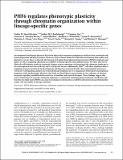PHF6 regulates phenotypic plasticity through chromatin organization within lineage-specific genes
Author(s)
Weintraub, Abraham S.; Buenrostro, Jason D.; Cheng, Christine S.; Regev, Aviv; Young, Richard A.; Soto Feliciano, Yadira M.; Bartlebaugh, Jordan M. E.; Sanchez-Rivera, Francisco Javier; Bhutkar, Arjun; Jacks, Tyler E.; Hemann, Michael; Liu, Yunpeng,S.M.Massachusetts Institute of Technology.; ... Show more Show less
DownloadGenes Dev.-2017-Soto-Feliciano-973-89.pdf (11.76Mb)
PUBLISHER_CC
Publisher with Creative Commons License
Creative Commons Attribution
Terms of use
Metadata
Show full item recordAbstract
Developmental and lineage plasticity have been observed in numerous malignancies and have been correlated with tumor progression and drug resistance. However, little is known about the molecular mechanisms that enable such plasticity to occur. Here, we describe the function of the plant homeodomain finger protein 6 (PHF6) in leukemia and define its role in regulating chromatin accessibility to lineage-specific transcription factors. We show that loss of Phf6 in B-cell leukemia results in systematic changes in gene expression via alteration of the chromatin landscape at the transcriptional start sites of B-cell-and T-cell-specific factors. Additionally, Phf6 KO cells showsignificant downregulation of genes involved in the development and function of normal B cells, show up-regulation of genes involved in T-cell signaling, and give rise to mixed-lineage lymphoma in vivo. Engagement of divergent transcriptional programs results in phenotypic plasticity that leads to altered disease presentation in vivo, tolerance of aberrant oncogenic signaling, and differential sensitivity to frontline and targeted therapies. These findings suggest that active maintenance of a precise chromatin landscape is essential for sustaining proper leukemia cell identity and that loss of a single factor (PHF6) can cause focal changes in chromatin accessibility and nucleosome positioning that render cells susceptible to lineage transition. Keywords: PHF6; phenotypic plasticity; chromatin regulation; leukemia; lineage maintenance; nucleosome positioning
Date issued
2017-06Department
Massachusetts Institute of Technology. Department of Biology; Koch Institute for Integrative Cancer Research at MITJournal
Genes & Development
Publisher
Cold Spring Harbor Laboratory Press
Citation
Soto-Feliciano, Yadira M. et al. “PHF6 Regulates Phenotypic Plasticity through Chromatin Organization Within Lineage-Specific Genes.” Genes & Development 31, no. 10 (May 15, 2017): 973–989 © 2017 Soto-Feliciano et al.
Version: Final published version
ISSN
0890-9369
1549-5477